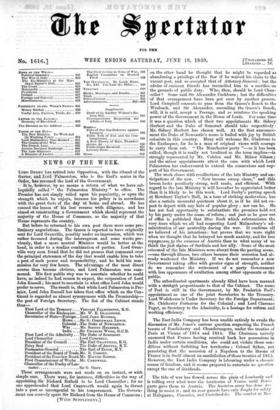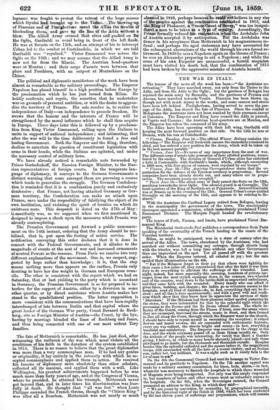The tide of war has flowed across the plain of
Lombardy and is rolling over what were the territories of Venice until Bona- parte gave them to Austria. The Austrian army has done no- thing to resist it ; and its rear guards have only fought for safety at Malegnano, Carionica, and Castelnedolo. The combat at Me-
legnano was fought to protest the retreat of the huge masses which Gyulai had brought up. to the Ticino. The blowing up of Piacenza and of Pizzighettosie saved the Allies the trouble of blockading them, and gave up the line of the Adda without a blow. The Allied Army crossed that river and pushed on fhz the Oglio, Garibaldi as usual being in front of the left flank He was at Brescia on the 12th, and an attempt of his to intercept Urban led to the combat at Castelnedolo, in which we are told Garibaldi was "repulsed." Victor Emmanuel was across the Oglio on the 13th ; and we may assume that the Allied Army is now not far from the Mincio. The Austrian head-quarters were at Mantua ; and their corps d'armee were between that place and Pesohiera, with an outpost at Montechiaro on the Chiese.
The political and diplomatic manifestoes of the week have been almost as remarkable as the military proceedings. The Emperor
Napoleon has placed himself in a high position before Europe by the proclamation which he has just issued from Milan. He boldly confronts, and repels, the assertion that he undertakes war on grounds of personal ambition, or with the desire to aggran- dize the territory of France. His sole resolve is, to realize the independence of Italy—an independence to precede freedom. He avows that the honour and the interests of France will be strengthened by the moral influence which he shall thus acquire in Europe. Three days later this is followed up by a proclama- tion from King Victor Emmanuel, calling upon the Italians to unite in support of national independence ; and intimating, that after the war will be the time deliberately to found a free and lasting Government. Both the Emperor and the King, therefore, decline to entertain the question of constituent legislation with arms in their hands, while the Italians are agitated, and under the necessary control of military laws.
We have already noticed a remarkable note forwarded by Prince Gortschakoff, the Russian Foreign Minister, to the Rus- sian representatives at foreign courts. In the temperate lan- guage of diplomacy, it conveys to the German Governments a distinct warning that some amongst them are pursuing a course which tends to generalize the struggle. The German Confedera- tion is reminded that it is a combination purely and exclusively denfensive ; that France, not having attacked Germany or Ger- man territory, the Confederation can make no attack upon France, save under the resposibility of falsifying the object of its own institution, and violating the spirit of treaties on which its existence rests. This despatch is dated on the 27th of May : -------ii, manifestly was, as we supposed when we first mentioned it, designed to impose a cheek upon the measures which Prussia was already contemplating.
The Prussian Government put forward a public announce- ment on the 14th instant, ordering that the Army should be mo- bilised, that is, put upon the footing of active service. The notification conveying this order declares that it is done in concert with the Federal Governments, and it alludes to the magnitude of events at the seat of war and increased armaments of neutral Powers as the reasons. From Paris we receive two very different explanations of the movement. One is, we suspect, sug- gested by hope rather than knowledge ; it is, that the step means nothing more than appears on the surface, Prussia only desiring to have her due weight in German and European coun- cils. The other is consistent with the report which we had on Saturday, that at last yielding to the party which is ascendant in Germany, the Prussian Government is so far prepared to in- terfere for the support of Austria, either by a diversion in some other quarter, or by direct assistance where Austria makes her stand in the quadrilateral position. The latter supposition is more consistent with the communications that have been rapidly interchanged of late between Berlin and that capital where the great leader of the German War party, Count Bernard de Rech- berg, sits as Foreign Minister of Austria—the Count, by the bye, having by marriage blended the lines of Rechberg and Jones, and thus being connected with one of our most ardent Tory families.



































 Previous page
Previous page